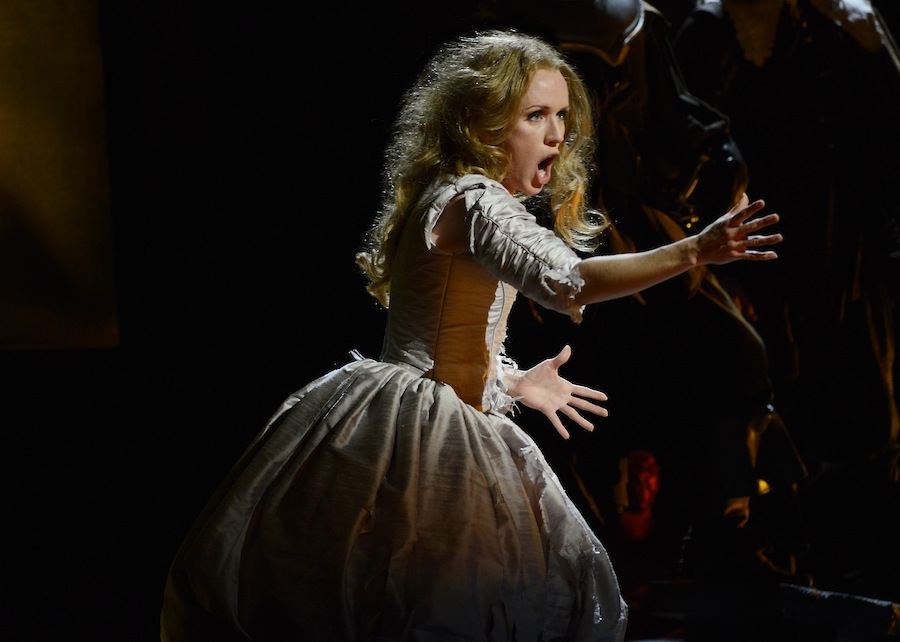Soprano provides the highlights in BLO’s uneven “Puritani”

Sarah Coburn stars as Elvira in Boston Lyric Opera’s production of Bellini’s “I puritani.” Photo: Eric Antoniou
Boston Lyric Opera’s season-closing production of Bellini’s I puritani proved a mixed bag. The company’s performance Friday night at the Shubert Theatre offered some beautiful singing and acting–especially from Sarah Coburn’s sparkling Elivra–and featured Bellini’s incorruptible melodies. But there was also some subpar singing and tepid direction.
I puritani was the last of Bellini’s three bel canto masterpieces and the composer’s final opera. Set during the English civil war, Elivra, daughter of a Puritan leader, is in love with Arturo, a Royalist supporter. Thanks to the efforts of Elivra’s uncle, Giorgio, the two are allowed to wed. But Arturo has to flee–without explanation–just before the wedding in order to rescue the imprisoned queen of England. Abandoned and heartbroken, Elivra descends into madness. It is only after Arturo returns that Elivra’s sanity is restored, but their tribulations aren’t over yet; Arturo has been declared a traitor, and is a hunted man.
Embedded in the convoluted plot are a treasure trove of rich melodies, especially for the lovelorn pair, Elvira and Arturo. The role of Elvira has attracted many sopranos over the last fifty years–including Maria Callas and Joan Sutherland–and is the raison d’etre of this production.
For the most part, Sarah Coburn rises to, and surpasses, the occasion. She possesses a silvery soprano with an agile coloratura, great musicality, and a complete command of the stage. She is at ease in the first act aria “Son vergin vezzosa” and sings with melting beauty after she discovers Arturo’s desertion (“Ah, vien al tempio”). But the high D’s that cap both scenes–she chooses the octave-higher interpolation in the latter mad scene–are pinched, and in the second instance, only barely attained. Fortunately, the E-flat at the end of Elvira’s second act mad scene is clean.
Coburn is more comfortable vocalizing the cabaletta than sustaining the long lines of the cavatina, but makes a marked impression in both. Where she truly raises the level of her performance is in her duet with the tenor after she has reunited with Arturo. Here, one feels that her voice has completely relaxed, and the phrasing becomes freer, more vibrant, and the high notes gain body. Coburn is compelling even when silent; one can see the madness flicker in her eyes.
Unfortunately, none of Coburn’s costars are quite at her level. Although I puritani has often been a soprano vehicle, Arturo’s part is equally important and is given as much richness of music. John Tessier has a clear, forward tenor with outstanding flexibility and high notes he can snatch out of the air with ease, but he does not deliver as Arturo. He neither musters enough body to his tone nor gives the musical line proper breadth. One knows something is wrong when the climactic vocal moments in Arturo’s first act aria “A te o cara” are practically buried by the timpani, and the whole thing goes by in barely a blink. Dramatically his execution of the role also left much to be desired.
Troy Cook as Riccardo, Arturo’s rival for Elivra’s love, possessed a thrillingly warm baritone, which made it all the more pitiable that he offered little modulation or varied coloring and dynamics.
Paul Whelan was better as Giorgio, Elivra’s uncle. His voluminous bass-baritone was expressively sympathetic in their scenes together. He was given some strange stage moves, however, from director Crystal Manich: despite being a dignified and elder statesman in the Puritan camp, he was practically swaggering in the act two duet “Suoni la tromba.” The production included a plot twist at the end, which seemed like a cheap distraction.
In the pit, David Angus was a generous conductor, underlining Bellini’s melodies colorfully and giving his singers space to breathe. But his handling of rubato seems more obligatory than heartfelt. He kept a tight rein on the chorus, which sang with precision if without much ardor, particularly the men.
Bellini’s I puritani runs through May 11 at he Shubert Theatre. blo.org
Posted in Performances